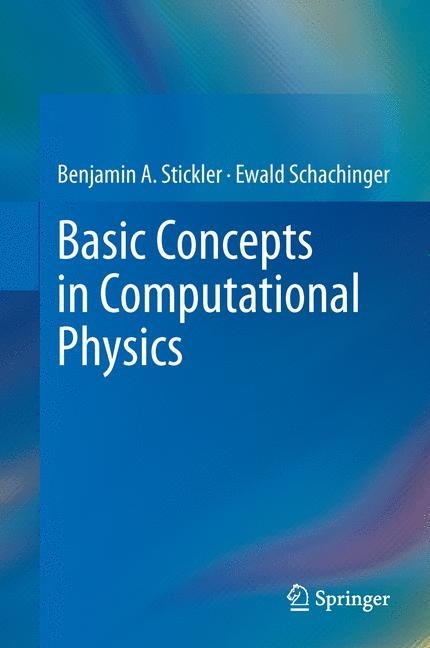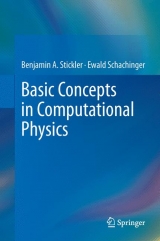Basic Concepts in Computational Physics
Springer International Publishing (Verlag)
978-3-319-02434-9 (ISBN)
- Titel gebraucht verfügbar
- Artikel merken
With the development of ever more powerful computers a new branch of physics and engineering evolved over the last few decades: Computer Simulation or Computational Physics. It serves two main purposes:- Solution of complex mathematical problems such as, differential equations, minimization/optimization, or high-dimensional sums/integrals.- Direct simulation of physical processes, as for instance, molecular dynamics or Monte-Carlo simulation of physical/chemical/technical processes.Consequently, the book is divided into two main parts: Deterministic methods and stochastic methods. Based on concrete problems, the first part discusses numerical differentiation and integration, and the treatment of ordinary differential equations. This is augmented by notes on the numerics of partial differential equations. The second part discusses the generation of random numbers, summarizes the basics of stochastics which is then followed by the introduction of various Monte-Carlo (MC) methods. Specific emphasis is on MARKOV chain MC algorithms. All this is again augmented by numerous applications from physics. The final two chapters on Data Analysis and Stochastic Optimization share the two main topics as a common denominator. The book offers a number of appendices to provide the reader with more detailed information on various topics discussed in the main part. Nevertheless, the reader should be familiar with the most important concepts of statistics and probability theory albeit two appendices have been dedicated to provide a rudimentary discussion.
Ewald Schachinger Institut für Theoretische und Computational Physik, Technische Universität Graz, Petersgasse 16, A-8010 Graz schachinger@itp.tugraz.ac.atBenjamin A. SticklerInstitut für Theoretische Physik, Karl Franzens Universität Graz, Universitätsplatz 5, A-8010 Graz, benjamin.stickler@uni-graz.at
Part I Deterministic Methods.- Numerical Differentiation.- Numerical Integration.- The KEPLER Problem.- Ordinary Differential Equations – Initial Value Problem.- The Double Pendulum.- Molecular Dynamics.- Numerics of Ordinary Differential Equations – Boundary Value Problems.- The One-Dimensional Heat Equation.- The One-Dimensional SCHRÖDINGER Equation.- Introduction to the Numerics of Partial Differential Equations.- Part II Stochastic Methods.- Pseudo Random Number Generation.- Random Sampling Methods.- A Brief Introduction to Monte-Carlo Methods.- The ISING Model.- Some Basics of Stochastic Processes.- The Random Walk and Diffusion Theory.- MARKOV Chain Monte Carlo and the POTTS Model.- Data Analysis.- Stochastic Optimization.- Part III Appendix.- Solving Non-Linear Equations. The NEWTON Method.- Numerical Solution of Systems of Linear Equations.- Basics of Probability Theory.- Phase Transitions.- Fractional Integrals and Derivatives in One Dimension,- Least Squares Fit.- Deterministic Optimization.- Index.
| Zusatzinfo | XVII, 377 p. 95 illus. |
|---|---|
| Verlagsort | Cham |
| Sprache | englisch |
| Maße | 155 x 235 mm |
| Gewicht | 720 g |
| Themenwelt | Naturwissenschaften ► Physik / Astronomie ► Allgemeines / Lexika |
| Schlagworte | Calculation Deterministic Methods • Calculation Stochastic Methods • Data Analysis Experiment • Informatik • Monte Carlo Method • Numerical Solution Equation • Physik • Textbook Computational Physics • Textbook Numerical Physics |
| ISBN-10 | 3-319-02434-5 / 3319024345 |
| ISBN-13 | 978-3-319-02434-9 / 9783319024349 |
| Zustand | Neuware |
| Haben Sie eine Frage zum Produkt? |
aus dem Bereich






